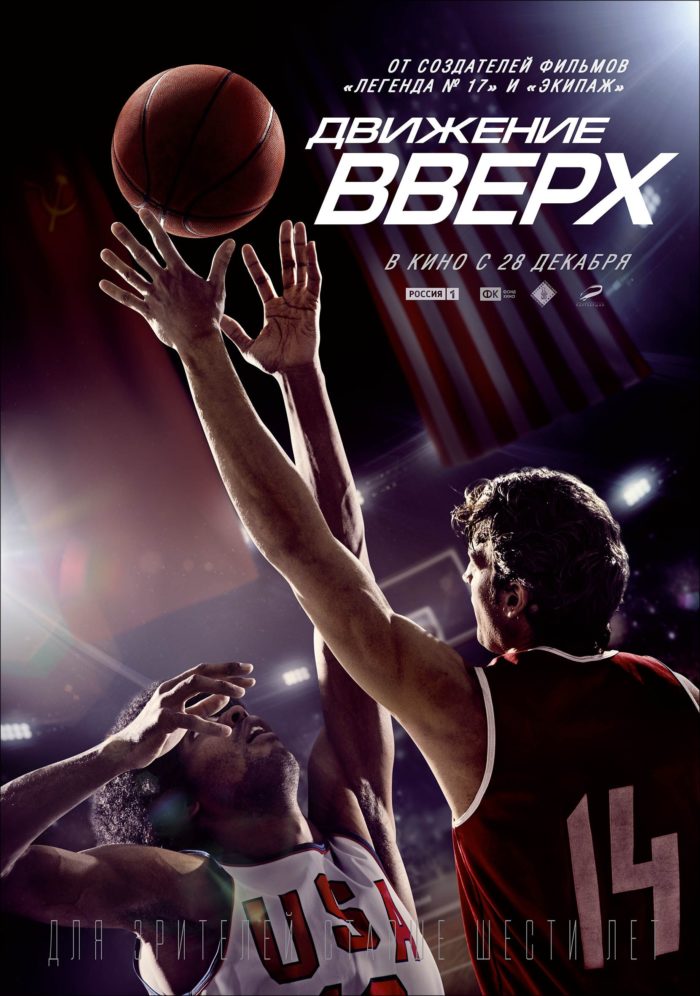Do you know anything about Soviet basketball? Did not you hear about the Munich Olympics in 1972? Perhaps you do not know about the outcome of the Soviet team too? The film “Dvizhenie vverh” (“Движение вверх”) by Anton Migerdichev(Антон Мигердичев) will help you to back to a time when Belov (Белов), Paulauskas (Паулаускас), Zharmukhamedov (Жармухамедов), Edeshko(Едешко), Sakandalidze(Сакандалидзе) and other players became legends of Soviet basketball.
Works related to sports, showing the growth of the hero/athlete throughout the entire film are very interesting. Ending of such films is certainly obvious. The actor tempers his/her spirit and believing in his/her strengths and opportunities, wins particular competition after experiencing all the difficulties and falls. Such movies are more exciting if they are based on real events. One of these is “Dvizhenie vverh ”(“Движение вверх”), became the highest-grossing film of Russian cinema(Vesti.ru).
For 36 years before XX Olympic Games, the US team was invincible. However, new coach of the USSR team Vladimir Kondrashin (Владимир Кондрашин), despite everything, believed in his team. As a result he was able to make the players believe in themselves. Believe that they can do the impossible. However the movie on this subject is not just an imitation of real matches. There are stories of love and betrayal, loyalty and cowardice too.
It should be noted that the basis of the film was the eponymous work of the famous Russian basketball player Sergei Belov (Сергей Белов). He was the first non-American to be included in the NBA Hall of Fame. His image was clearly expressed by Kirill Zaitsev (Кирилл Зайцев) in the film. Confident, principled and calm player grabbed the attention of viewers from the first minutes.
An important role in the success of the film was played by the diversity of the main characters, which remained in the memory of the spectators with their distinctive features. Funny, sociable Georgians Corkia(Коркиа)and Sakandelidze(Сакандалидзе). Quick-tempered Lithuanian Paulauskas(Паулаускас), who the authors somehow made an anti-Soviet. Relying more on intuition than on blind eyes Kazakh Zharmuhamedov(Жармухамедов). Simple Belarusian Edeshko(Едешко). These famous athletes were described well enough that the viewers have an image a team, an international, but united in spirit and aims.
This film is historical in that for the first time the Kazakh pride Alzhan Zharmukhamedov(Алжан Жармухамедов) was introduced to the Kazakh people. Аfter this film the people learned about champion who ventured to play in the final match despite his poor eyesight.
I should note the techniques of making the film dramatic, showing moments that were not at all at that time. For example, playing at the street with local American street players, ending up with Russians’ lose. Athletes admit that there was no distribution of bonuses in envelopes after the match, as well as giving money to the coach for the treatment of the child. However, these scenes showed the good nature and cohesion of the team and coach. In spite of the fact that quite simple tricks were used, there were often a slowdown of frames at those 3 seconds of the final match, the tension did not leave until the very last moment.
Despite some additions of directors for a more vivid picture, the film is successful among spectators and to some extent rallied the peoples of the post-Soviet space.
Aruzhan Kuandyk
